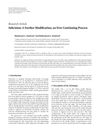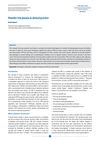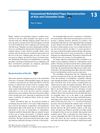 8 citations,
January 2012 in “Dermatology Research and Practice”
8 citations,
January 2012 in “Dermatology Research and Practice” New subcision technique with a bent needle and syringe improves ease, effectiveness, and comfort for treating acne scars.
[object Object]  7 citations,
April 2023 in “Frontiers in immunology”
7 citations,
April 2023 in “Frontiers in immunology” Oral baricitinib and ruxolitinib are effective and safe for treating alopecia areata.
 7 citations,
January 2016 in “Methods in molecular biology”
7 citations,
January 2016 in “Methods in molecular biology” Mouse hair follicle stem cells were successfully isolated and used to regenerate hair follicles with two different methods.
 7 citations,
March 2020 in “Lasers in Medical Science”
7 citations,
March 2020 in “Lasers in Medical Science” LLLT is a safe, promising hair loss treatment, but more research needed.
 7 citations,
December 2017 in “Anais da Academia Brasileira de Ciências”
7 citations,
December 2017 in “Anais da Academia Brasileira de Ciências” 6-Gingerol from ginger may slow down hair growth by affecting certain enzymes and growth factors.
 7 citations,
April 2011 in “Expert review of dermatology”
7 citations,
April 2011 in “Expert review of dermatology” The document concludes that patients with skin of color need specialized dermatological care and education to manage unique skin conditions effectively.
 6 citations,
July 2017 in “Clinics in Plastic Surgery”
6 citations,
July 2017 in “Clinics in Plastic Surgery” The document concludes that individualized reconstruction plans are essential for improving function and appearance after head and neck burns.
 5 citations,
September 2022 in “Research Square (Research Square)”
5 citations,
September 2022 in “Research Square (Research Square)” CD201+ fascia progenitors are essential for wound healing and could be targeted for treating skin conditions.
 5 citations,
August 2020 in “Stem Cell Research & Therapy”
5 citations,
August 2020 in “Stem Cell Research & Therapy” Using fat-derived stem cells with the drug meglumine antimoniate can help control skin disease and reduce parasites in mice with leishmaniasis.
 5 citations,
May 2020 in “Pharmaceutical Research”
5 citations,
May 2020 in “Pharmaceutical Research” Heat and chemicals improve finasteride delivery to scalp and hair follicles, potentially enhancing treatment for hair loss.
5 citations,
January 2020 in “Acta dermatovenerologica Alpina, Pannonica et Adriatica (Tiskana izd.)” Injecting platelet-rich plasma or applying it with a laser or microneedling can treat hair loss effectively. The laser and microneedling methods cause less pain.
 5 citations,
March 2001 in “Journal of biomechanics”
5 citations,
March 2001 in “Journal of biomechanics” Growing hairs are easier to pull out than resting hairs due to different anchorage strengths.
4 citations,
June 2023 in “Frontiers in immunology” JAK inhibitors help hair regrowth in alopecia areata but have a high risk of side effects.
 4 citations,
September 2011 in “Expert Review of Dermatology”
4 citations,
September 2011 in “Expert Review of Dermatology” Various treatments exist for alopecia areata, but none are completely satisfactory; choice depends on age, disease extent, and preference.
 4 citations,
August 2011 in “Aktuelle Dermatologie”
4 citations,
August 2011 in “Aktuelle Dermatologie” Topical melatonin is a safe treatment that may reduce hair loss in people with androgenetic alopecia.
 4 citations,
May 2002 in “Therapeutische Umschau”
4 citations,
May 2002 in “Therapeutische Umschau” AGA treated with finasteride, minoxidil, and hair transplantation.
 3 citations,
January 2012 in “Elsevier eBooks”
3 citations,
January 2012 in “Elsevier eBooks” Burn scars form abnormally due to changes in wound healing, and more research is needed to improve treatments.
 3 citations,
August 2011 in “InTech eBooks”
3 citations,
August 2011 in “InTech eBooks” The document concludes that skin grafts are essential for repairing tissue loss, with various types available and ongoing research into substitutes to improve outcomes and reduce donor site issues.
 3 citations,
January 2023 in “Physiological Research”
3 citations,
January 2023 in “Physiological Research” Conditioned media from mesenchymal stem cells show promise for tissue repair and disease treatment, but more research is needed on their safety and effectiveness.
 3 citations,
May 2021 in “Dermatologic Clinics”
3 citations,
May 2021 in “Dermatologic Clinics” COVID-19 changed dermatology by increasing telemedicine and highlighting healthcare disparities.
 3 citations,
June 2017 in “Journal of Biomaterials Applications”
3 citations,
June 2017 in “Journal of Biomaterials Applications” Keratin extract from human hair was found to promote hair growth in mice.
 3 citations,
January 2016 in “South African family practice”
3 citations,
January 2016 in “South African family practice” Platelet-rich plasma is considered safe but needs more research to prove its effectiveness in medical treatments.
 3 citations,
November 1999 in “Journal of Cutaneous Medicine and Surgery”
3 citations,
November 1999 in “Journal of Cutaneous Medicine and Surgery” Examining scalp biopsies in different ways helps better diagnose hair loss types.
 2 citations,
October 2010 in “Springer eBooks”
2 citations,
October 2010 in “Springer eBooks” Using cheek skin and cartilage grafts for nose reconstruction after skin cancer surgery can maintain shape and function but may require multiple surgeries and hair removal in men.
 2 citations,
May 2023 in “bioRxiv (Cold Spring Harbor Laboratory)”
2 citations,
May 2023 in “bioRxiv (Cold Spring Harbor Laboratory)” Sebaceous glands can heal and regenerate after injury using their own stem cells and help from hair follicle cells.
 2 citations,
June 2020 in “Skin Research and Technology”
2 citations,
June 2020 in “Skin Research and Technology” MRI reveals thinner scalps and smaller hair follicles in people with androgenetic alopecia.
[object Object]  2 citations,
December 2019 in “Journal of Dermatological Treatment”
2 citations,
December 2019 in “Journal of Dermatological Treatment” Metabolic syndrome reduces effectiveness of hair loss treatment.
 2 citations,
November 2019 in “Cancer reports”
2 citations,
November 2019 in “Cancer reports” The Wnt signaling pathway is not a major factor in the development of keratoacanthoma, a type of skin tumor.
 2 citations,
August 2019 in “BMC Complementary and Alternative Medicine”
2 citations,
August 2019 in “BMC Complementary and Alternative Medicine” Asiasari radix extract may be a potential treatment for melanoma because it selectively triggers cell death in melanoma cells by affecting p53 regulation.
 2 citations,
January 2019 in “Medizinische Genetik”
2 citations,
January 2019 in “Medizinische Genetik” The document reports findings on genetic research, including ethical concerns about genome editing, improved diagnosis of mitochondrial mutations, solving inherited eye diseases, confirming gene roles in epilepsy, linking a gene to aneurysms, and identifying genes associated with age-related macular degeneration.




























